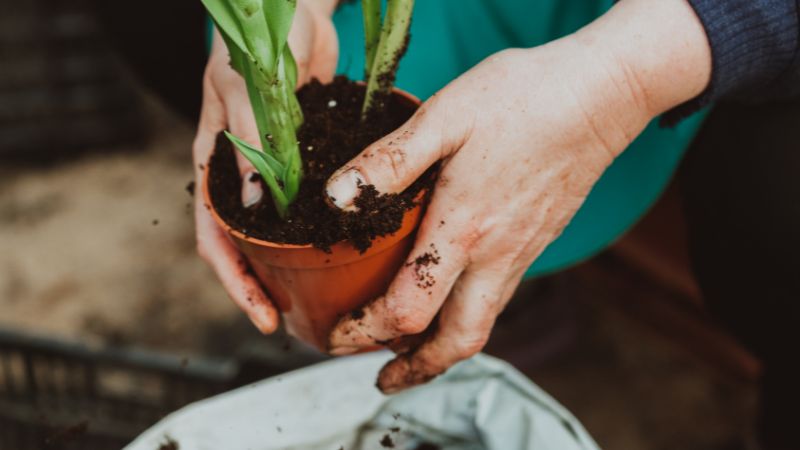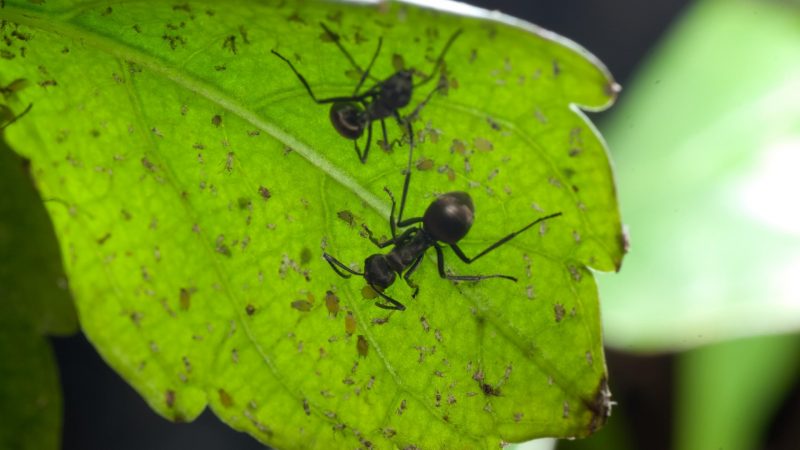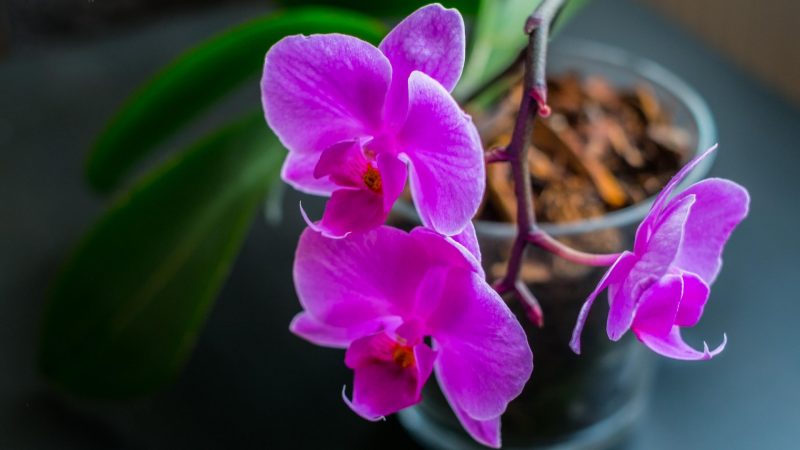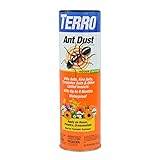Ants love and are attracted to honeydew that is made by insect pests such as aphids, whiteflies, and mealybugs. Unfortunately, several common houseplants produce honeydew, ultimately attracting ants into your home.
So, how to get rid of ants in potted plants? First, check the soil for the presence of nests or colonies. Remove them and carefully dispose it. Using a 1:1 ratio of vinegar and water solution, water the plant and install ant bait traps to deter remaining ants. Apply cinnamon or diatomaceous earth. Lastly, keep the plant and the area around it clean.
Are some plants more attractive to ants, and are there some natural methods that you can use for ant control? If the problem is recurring we have provided additional guidance in the following sections below.
How to Get Rid of Ants in Potted Plants | Step by Step Guide
Here’s six simple steps for you to follow and get rid of ants in your houseplants effective immediately:
- Check the top layer of soil for ant nests or colonies
- Carefully remove the nest and dispose of it
- Water the plant with a solution of one part vinegar and one part water to repel the remaining ants.
- Apply Cinnamon or diatomaceous earth which will deter ants from returning.
- Place ant bait traps around the plant to help eliminate any remaining ants.
- Ensure the plant and the area around it is clean and free of any food debris
How to Get Ants Out of Potted Plants: Instructions

Aside from the guide above, in order to get rid of them in potted plants, we recommend applying one of our methods or combining both of them. Our guide is a sure way to get rid of the entire colony, which means that you won’t have to worry about them for quite some time.
Method 1: Ant Baits and Insecticide Dust
Try to identify the routes ants are using to get near your plants. When you find them, plant the ant baits next to them. You can use a liquid ant bait that is perfectly safe to use around your home.
- ATTRACTS & KILLS: Effectively targets and eliminates common...
- KILLS THE ANTS YOU DON'T SEE: Terro ant bait is designed to share...
- FAST-ACTING: Noticeable ant activity reduction within days as...
- READY TO USE: Simply place ant baits indoors with no setup...
- VERSATILE HOME PLACEMENT: Ideal for use as terro ant traps along...
- One 8 count package of Raid Ant Killer Baits protects against...
- Raid Ant Killer works for up to 3 months to help control ants in...
- This pest killer comes in convenient Raid Ant Traps where ants...
- Raid Ant Killer is ideal for use throughout your home, including...
- Try other Raid bug spray and insect killer products for all of...
- EFFECTIVE ANT ELIMINATION: Terro outdoor liquid ant baits attract...
- COLONY CONTROL: Worker ants carry Terro ant bait back to the...
- FAST-ACTING RESULTS: With the use of Terro ant killer, experience...
- SIMPLE SETUP: Terro outdoor ant bait is easy to use with insert...
- OUTDOOR PROTECTION: Place Terro ant bait stations outdoors to...
Another option is insecticide dust which is also very efficient. Simply apply the dust around your potted plants and on the ant trails. The dust will take effect and keep the area protected for quite a while.
- Effectively Kills Insects - Kills ants (including fire &...
- Waterproof Formula - The waterproof dust won't wash in the rain
- Fast Acting & Long Lasting - This dust kills insects on contact...
- Easy to Apply - The convenient shaker canister allows for both...
- Use Indoors & Outdoors - Apply in cracks and crevices, around...
- Delta Dust Bed Bug Insecticide - 1 lb.
- Yield: 1 lb. of Delta Dust covers about 2,000 sq.ft.
- Target Pest: Ants, Bed Bugs, Boxelder Bugs, Cockroaches,...
- Active Ingredient: Deltamethrin, 0.05%
- Cannot ship to NY or CT.
- POWERFUL BROAD-SPECTRUM CONTROL: Tirade 1% Dust contains...
- READY TO USE + EASY TO APPLY: Control insects without the hassle...
- KILL 50+ HOUSEHOLD INSECTS: Wipe out common household insects...
- ONE PRODUCT FOR INDOOR + OUTDOOR USE: Tirade 1% Dust may be used...
- NO STAINS, NO STRONG SCENTS: Tirade 1% Dust is low-odor and...
Method 2: Ant Spray
For all those ants that somehow avoided the bait, you can use a natural insecticide in the form of a spray. It works instantly and it is meant to be used on ants that you see. After these two methods, your potted plants will be free of ants for quite some time.
- Raid Ant & Roach kills a wide variety of insects including...
- Crawling insect killer with residual insecticide power for up to...
- Also kills palmetto bugs, silverfish, crickets, earwigs,...
- Ant & Roach spray with no lingering chemical odor
- Easy-to-use Ant & Roach killer for application where listed bugs...
- Bug spray that quickly kills ants, roaches and flies
- Plant-based active ingredient bug killer safe for use around...
- Entomologist tested bug spray made with botanical extracts to...
- Bug killer for indoor and outdoor use, wherever bugs try to...
- Rooted in Nature, Optimized by Science
- Start killing ants, roaches, spiders, fleas and ticks with Ortho...
- This insect control spray kills listed bugs and protects your...
- Use this indoor insect spray in kitchens, bathrooms and...
- Create an insect barrier anytime as a preventative treatment or...
- Apply Ortho Home Defense Max Indoor Insect Barrier using the...
Related: Best Natural Ant Sprays | Kids and Pet-Friendly Sprays
Method 3: Changing the Soil
If you really want to keep the plants healthy then consider also changing the soil. This will also mechanically remove any ants that are currently residing on your plant. If you do this, be very careful and try not to damage the root system of your plant.
- Burpee Organic Premium growing mix is enriched with Burpee plant...
- Perfect for container and raised bed gardening, this growing mix...
- Formulated with coconut coir, a sustainable and renewable...
- Omri listed for Organic use
- Enriched with Burpee plant food
How to Get Rid of Ants in Outside Potted Plants
The use of ant baits has shown the best results when dealing with ants that infest potted plants that are located outside. This way you will get rid of them for good because the insecticide bait will destroy their entire colony.
- Kills the ants you see and the ants you don’t
- Pre filled bait stations are ready to use
- Contains sodium tetraborate decahydrate (Borax) (5.40%) and other...
- Flexible placement: in the ground using the stakes or on decks,...
- Patented station protects the bait from the elements, prevents it...
Ants in Potted Plants| FAQ
Why Are Ants in My Potted Plants?
Several reasons can be identified as a source of an ant infestation around your potted plants. We already mentioned some insects that produce honeydew which ants use for food, but there are a couple of other causes as well:
- Old potting mix can’t absorb water as well as a fresh mix. When this happens you will end up with dry soil full of cracks. These cracks are heaven for ants to inhabit. If you notice that the soil is not absorbing water then it is time to change it. Do it carefully as the roots are easily damaged.
- Compost is almost always warm in the center and that is a great place for ants to live and hide in. When using compost first check it for ants and if you see any of them simply don’t use it.
- Excess water can be very attractive to ants during hot summer times when they want to cool themselves off.
Can Ants Kill Plants in Pots?

Ants can rarely be directly responsible for dead plants. Sometimes when there are too many ants in the soil they can disturb their root system and cause the plant to die out.
Their tunnels in the soil can sometimes be even beneficial but if the roots or young or fragile, they can easily be damaged. Also, ants can carry various soil bacterias that can damage the plant.
Are Ants Bad or Good for Potted Plants?
Having ants in your potted plants can sometimes point to bigger problems such as having other pests that ants are attracted to. These pests attract ants because they leave a honeydew trail that ants use as food.
When ants run into these insects and with their sheer numbers they will overcome them and as a result even kill them in the end. If you look at ants from this perspective, they can prove to be helpful in defending your plant.
Also, ants can help the root system of the plant by digging the tunnels in the soil and thus allowing better drainage and airflow. On the other side, an ant infestation can bring several types of plant diseases, so it is best to keep their numbers as low as possible.
Related: Eliminate Ants from Your Garden | Proven Techniques and Tips!
Types of Ants in Soil of Potted Plants
The following ants love to infest potted plants:
- Argentine ants
- Odorous house ants
- Pavement ants
- Red imported fire ants
- Southern fire ants
- Thief ants
Related: How Many Types of Ants Are There: Ant Identification Chart
Types of Potted Plants That Are Attractive to Ants
Some types of plants are proven ant magnets and the common reason for that is the nectar they produce. Nectar is produced to attract pollinators to the plant, but because it contains sugar it can attract ants as well.
Common plants that attract ants are:
- Peonies. This plant is one of the favorites when you want to bring a sweet-smelling plant into your yard. Ants are attracted to them because of the sweet nectar they produce.
- Wild parsnip. This aggressive weed is found in wet climate areas and it is almost always infested with ants. Again the reason for that is the nectar they produce and almost all kinds of ants will seek to infest it.
- Desert willow. This attractive plant can be found decorating yards in the southwestern parts of the United States. But like the plants above it produces the nectar that will lure the ants very quickly and in large numbers.
Ants in Potted Tomato Plants
For protecting tomatoes from ants you can combine some of these home remedies or simply use our above guide:
- Peppermint, catnip, and pennyroyal are proven ant repellers. Planting them near your tomatoes can keep the ants away.
- Place cucumber peels around your plant. Ants hate the smell of cucumber so they will keep away from the tomato.
- If you notice the holes in tomato plant leaves, treat them against aphids and whiteflies. Once you get rid of them the number of ants should be lowered as well.
- Make a garlic spray and use it directly on the plant and around it. Use the spray regularly because it will wear off quickly. Ants and other pests are repelled by garlic so it can be a universal help for many plants.
Ants in Potted Orchid Plants

Orchid plants don’t attract ants but sometimes some insects that create honeydew will lure ants to them. If that happens you can try placing fly sticky tapes around the pot to keep ants and other insects physically away from the orchid.
If there is a larger infestation at hand you can also try diatomaceous earth. It will keep the ants away for some time. If that doesn’t show results then use our guide with ant baits in combination with replanting the orchid (changing the soil).
Carefully take the plant from the pot and remove as much soil as you can without hurting the plant. Place new soil in a different pot and plant the orchid in it. If you want to reuse the old pot clean it thoroughly.
Home Remedy for Ants in Potted Plants | Natural Methods
A lot of products regularly used in the home can be used to keep ants away from potted plants. These are the ones that show the best results:
- Garlic Spray. Mix oil, garlic, and water into a spray bottle and apply it directly to the plant and around it. This method requires regular reapplying.
- Lemon Spray. Make a spray that combines lemon juice and water. Ants hate the scent of lemons and will keep away from the area sprayed with them. You can use an orange spray instead of a lemon for the same results.
- Coffee Grounds. It will not only keep ants away from plants but will also add some nutrients to the soil. Keep in mind that ants can easily maneuver around these, so make sure to use coffee grounds with other remedies.
- Peppermint. This plant will keep a lot of pests away from your plants so we highly recommend using it. We recommend getting a peppermint essential oil and making a natural repellent spray with it.
- 100% PURE & NATURAL PEPPERMINT OIL - Majestic Pure Blends oils...
- PREMIUM GRADE & QUALITY – All Majestic Pure Blends Essential...
- HIGH QUALITY GLASS BOTTLE – Our Essential Oil comes in an amber...
- PEPPERMINT OIL BLENDS WELL WITH – Basil, Coriander, Eucalyptus,...
- BOTTLED – Our oils are sourced from the best regions all over...
Related: How to Get Rid of Ants | Safe and Effective Methods
List of Sources
Gryder, J. (n.d.). Do You Have Ants on Your Plants?.
Quish, C. (n.d.). Ants and Plants.
Rosumek, F. B., Silveira, F. A. O., de S Neves, F., de U Barbosa, N. P., Diniz, L., Oki, Y., Pezzini, F., Fernandes, G. W., & Cornelissen, T. (2009). Ants on plants: a meta-analysis of the role of ants as plant biotic defenses.
Turpin, T. (n.d.). Ants in Your Plants.
- How to Get Rid of Copperheads | Practical Guide - August 27, 2023
- How to Get Rid of Corn Snakes | What Makes Them Aggressive? - August 27, 2023
- How to Get Rid of Alligators | Safety Measures and Removal Methods - July 16, 2023













